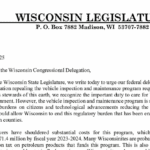For decades, Wisconsin state employees enjoyed a partial holiday on Good Friday, with state offices closing from 11 a.m. to 3 p.m. to observe the Christian holiday. However, this practice has been replaced with a floating legal holiday system, reflecting a broader shift in how the state manages employee leave and accommodates diverse workforces.
Historically, Wisconsin recognized Good Friday as a partial state holiday under state statute, granting employees a four-hour closure to mark the religious observance. According to the Wisconsin Employment Law Handbook, this practice was unique, as Good Friday was not a full holiday but allowed state workers time off during the afternoon hours. The policy applied to state agencies, though private employers were not required to offer the same benefit.
The transition away from a designated Good Friday holiday began as part of broader reforms to Wisconsin’s legal holiday structure. By the early 2000s, the state standardized its holiday policy to provide nine paid legal holidays annually, with floating holidays granted in specific circumstances, such as when a holiday falls on a Saturday or when employees work on a legal holiday. Good Friday’s partial holiday status was phased out, and it is no longer listed among the state’s recognized legal holidays, which now include New Year’s Day, Martin Luther King Jr. Day, Memorial Day, Independence Day, Labor Day, Thanksgiving, Christmas Eve, Christmas Day, and New Year’s Eve.
The change was driven by a combination of administrative streamlining and a push for greater flexibility in employee leave. State officials aimed to create a more equitable system that did not prioritize one religious observance over others, aligning with broader diversity and inclusion goals. The floating holiday system allows employees to use their earned leave for personal or cultural observances, including religious holidays like Good Friday, without mandating a specific day off for all. For example, employees can request floating holiday hours for Good Friday or other significant dates, subject to supervisory approval.
The shift has not been without debate. Some employees valued the traditional Good Friday closure as a nod to Wisconsin’s cultural heritage, while others welcomed the flexibility of floating holidays to accommodate diverse beliefs and schedules. The Wisconsin Division of Personnel Management, which oversees human resources for state agencies, emphasizes that the current system ensures fairness while meeting operational needs.
Floating holiday hours must typically be used within the fiscal year they are earned, with a deadline of June 30, or they are forfeited. This policy encourages employees to plan their leave strategically, whether for religious observances, personal milestones, or extended weekends.
Wisconsin’s move to floating holidays reflects a broader trend among states to balance workplace flexibility with operational demands. While Good Friday remains a significant observance for many, the state’s policy now prioritizes employee choice over a one-size-fits-all approach.
















